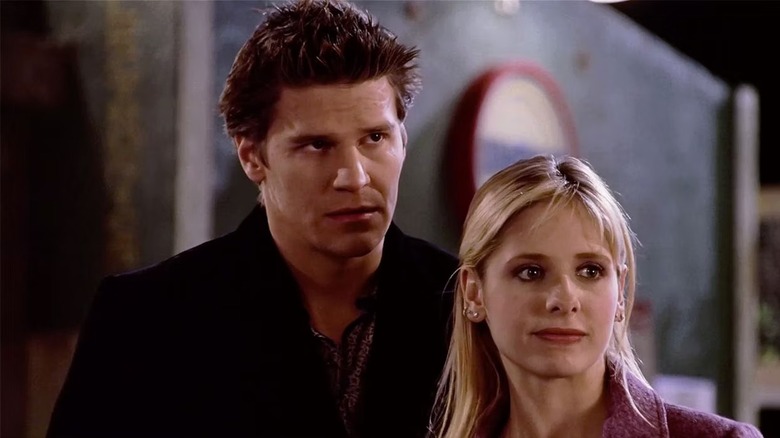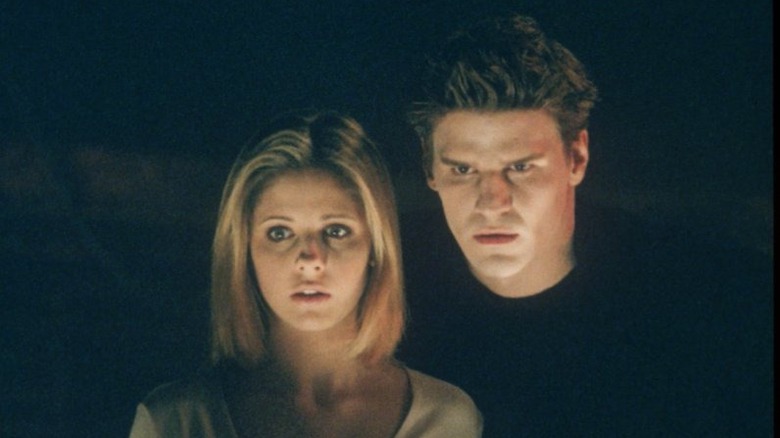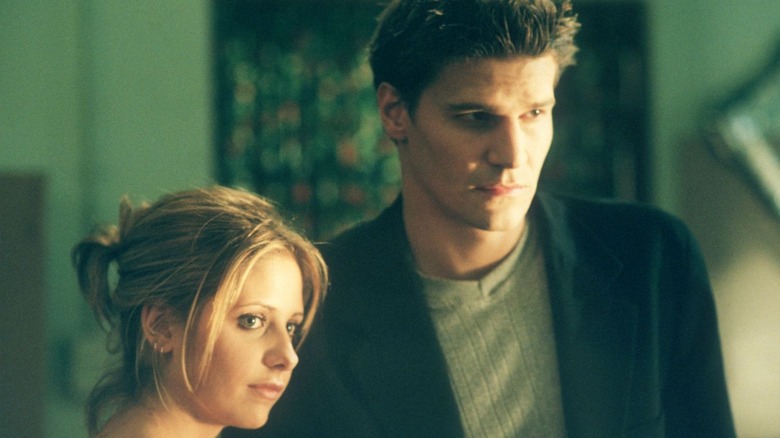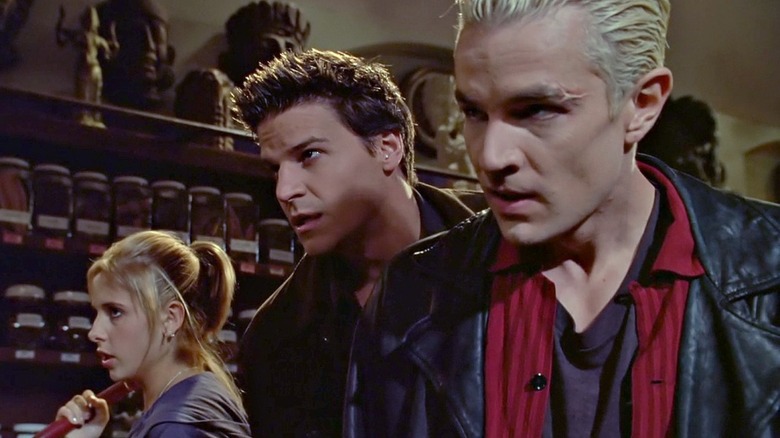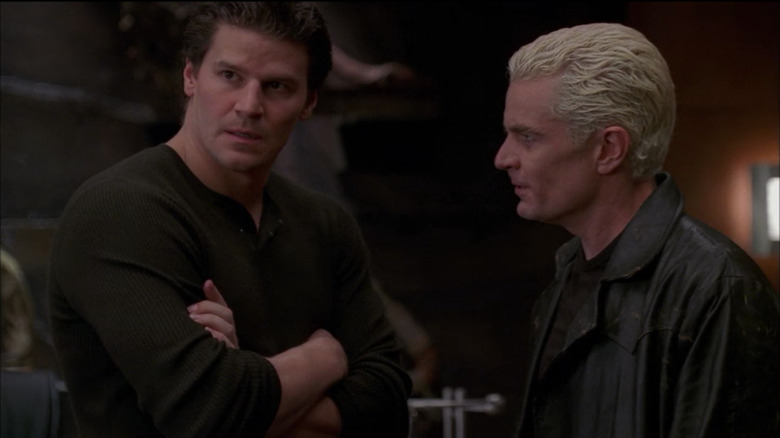Joss Whedon Broke His Own Biggest Rule By Adding Angel To Buffy The Vampire Slayer
One of the things that made "Buffy the Vampire Slayer" so addictive was the forbidden romance with the vampire Angel. He is a bad-boy-turned-good, a very handsome demon who was cursed with a soul that made him into a noble warrior for good guys — unless, of course, he experiences one moment of true happiness.
The character was such a major part of the show that he even earned his own spin-off, "Angel." More importantly, he provided the first romantic counterpart for "Buffy," and what's a teen soap without some romance? But he wasn't just any boyfriend — he was mysterious, he was dangerous, and he was a part of her demonic world. However, Angel did present one major problem: he challenged the central metaphor of the series. In fact, series creator Joss Whedon didn't even want him in the show at first.
By now we are used to romantic images of vampires in popular culture, from Anne Rice's "Interview with a Vampire" to Stephenie Meyer's "Twilight" series, but Whedon wanted to present a very different version. To him, the demons represented the obstacles that a teenage girl faces. They might seem handsome or charming on the surface, but their seductive qualities give way to a decidedly ugly side. When "Buffy" vampires feed on people, their faces transform into hideous bumpy masks, sucking the lust out of the scene.
Angel and his even more morally compromised successor Spike both threw a wrench into Whedon's metaphor. To some, it made it seem like the series encouraged relationships with violent men. Coupled with Whedon's other allegations, the feminist message of the show is severely tainted. However, "Buffy" star James Marsters, who played Spike, insisted that the series creator was opposed to both romantic vampire characters from the beginning.
Evil wasn't supposed to look cool in Buffy
Marsters explained Whedon's alternative vision for vampires in an interview with Christopher Golden for his book "Buffy the Vampire Slayer: 20 Years of Slaying."
"I think the principal one is that evil is not cool to Joss Whedon. [...] Hollywood quite often does a disservice by making evil look cool. It works for a story to make the villain cool, and everyone likes a villain that you love to hate, but it sets up a strange message sometimes. So in Joss's world on 'Buffy,' vampires were not supposed to be sexy. [...]They were supposed to be metaphors for the challenges that you meet when you're a teenager. So we were supposed to be ugly and very quickly killed off. That's why he had us 'vamp out' when we bit someone because he didn't want it to be sensual at all; he wanted it to be horrific."
Angel was fan service for Whedon, but he was supposed to be the only vampire that broke the metaphor. His story was carefully crafted to fit into Buffy's world, but the series creator wouldn't have put Angel into the show in the first place if not for David Greenwalt, who wrote for the first three seasons of "Buffy" and went on to co-create the vampire's spin-off with Whedon.
"It was not his idea that wasn't an original part of his vision for the show, but he got talked into it, and Angel took off like a rocket ship," said Marsters. "Which is not surprising, because the audience wants that sexy vampire. There's a hunger for it whenever you do a vampire show, so he was satisfying that."
Angel was only supposed to have six episodes
Even after Whedon agreed to write Angel into the show, he was never intended to be a permanent fixture in the Buffyverse. He wasn't even supposed to be around for an entire season, but the vampire immediately earned heartthrob status and it became impossible to get rid of him. David Boreanaz, who plays Angel, was rather obscure at the time, but the breakout role launched him into a long career of television stardom.
"[Angel] initially had an arc of six out of the 12 episodes," the actor told Entertainment Weekly. "He was somebody who could be recurring and a love interest to Buffy [Sarah Michelle Gellar]. It happened so quickly, but in order for things to happen quickly when you recognize them, you have to be ready; when it hits, it's quick. When 'Buffy' hit, I was in the right spot at the right time[.]"
The sexy vampire that Whedon was so opposed to went from six to 12 to several hundred episodes between the series. The perpetual extension of Angel's arc reminds me of a dad who reluctantly gets a dog for his children and ends up loving it more than anyone else in the family. Boreanaz went on to star in more hit television series like the procedural dramedy "Bones" and the CBS military series "Seal Team."
Of course, Buffy never did escape the vampiric romance, even after Angel departed Sunnydale for Los Angeles. Because if Whedon thought that Angel compromised the morality of his show, Spike was 10 times bigger of a threat.
Spike wasn't designed to be a romantic character
Now, Angel might have only started with a six-episode contract on "Buffy," but Spike — who ended up outstaying him on the series — only had five. When the leather-clad British bad boy crashed into Sunnydale at the beginning of season 2, he was set up to be the major villain of the first half of the season, only to be defeated by the stronger Big Bad of the season, Angel.
"He was just Drusilla's boy toy for five episodes and he was going to be Angel's first victim," Marsters explained at a panel in 2019. "Like the whole point of the season, this was over on the other show, was that Buffy would get her heart broken by Angel. They finally hook up and then Angel goes evil. Then Buffy would really, really cry all the time. And then his first act of evil was to take me down. So they only built me up to be cool so that when Angel killed me he would look awesome."
Spike wasn't supposed to survive the show's second season, let alone return as Buffy's love interest, but the strong fan reaction became impossible to ignore. Even still, Whedon tried his hardest to resist bending to the audience's desires. "I don't think that Spike was designed to be a romantic character," Marsters continued. "I remember when after a couple episodes, the fan reaction was that I was a romantic character. Joss backed against the wall and said, 'I don't care how popular you are, kid. You are dead. You are dead, you hear me?”'
And then Spike didn't die.
Did Spike and Angel ruin the message of Buffy?
After Whedon agreed not to kill Spike off, he was brought back on as a recurring character in season 4. The soulless vampire with a bleeding heart presented a huge challenge to the writers since he defied the central metaphor of the show even more dramatically than Angel had. The "Buffy" writers, talented as they were, "never really knew what to do with Spike," Marsters confessed to RadioTimes.com. In place of an organic narrative arc that would intertwine neatly with the others, the writers had to get creative.
"I was the villain, and then I was the wacky neighbor, and then I was the wrong boyfriend, and then I was the fallen man trying to redeem himself," the actor continued. "And then ultimately a kind of guinea pig hero by the end." Marsters thought that Whedon was far too lenient by letting him stay in the cast. If it had been up to the actor, he never would have sacrificed the integrity of the show's central metaphor for the sake of a popular character. However, he does credit the writers with finding a clever way to incorporate him into the show.
"I mean, the whole thing is, how do we get this guy on without having him ruin the theme?" he went on. "If it had been me producing that show, I would have killed Spike off in a heartbeat. As soon as the audience said, 'Oh, we want him. Oh, have him with Buffy. Oh, we love that character.' Like uh-uh. He's ruining the whole thing. I would have killed me off after probably three episodes."
Whether it ruined the feminist allegory or not, Whedon's fan service provided us with two incredible characters and two unforgettable love stories — for better or worse.
